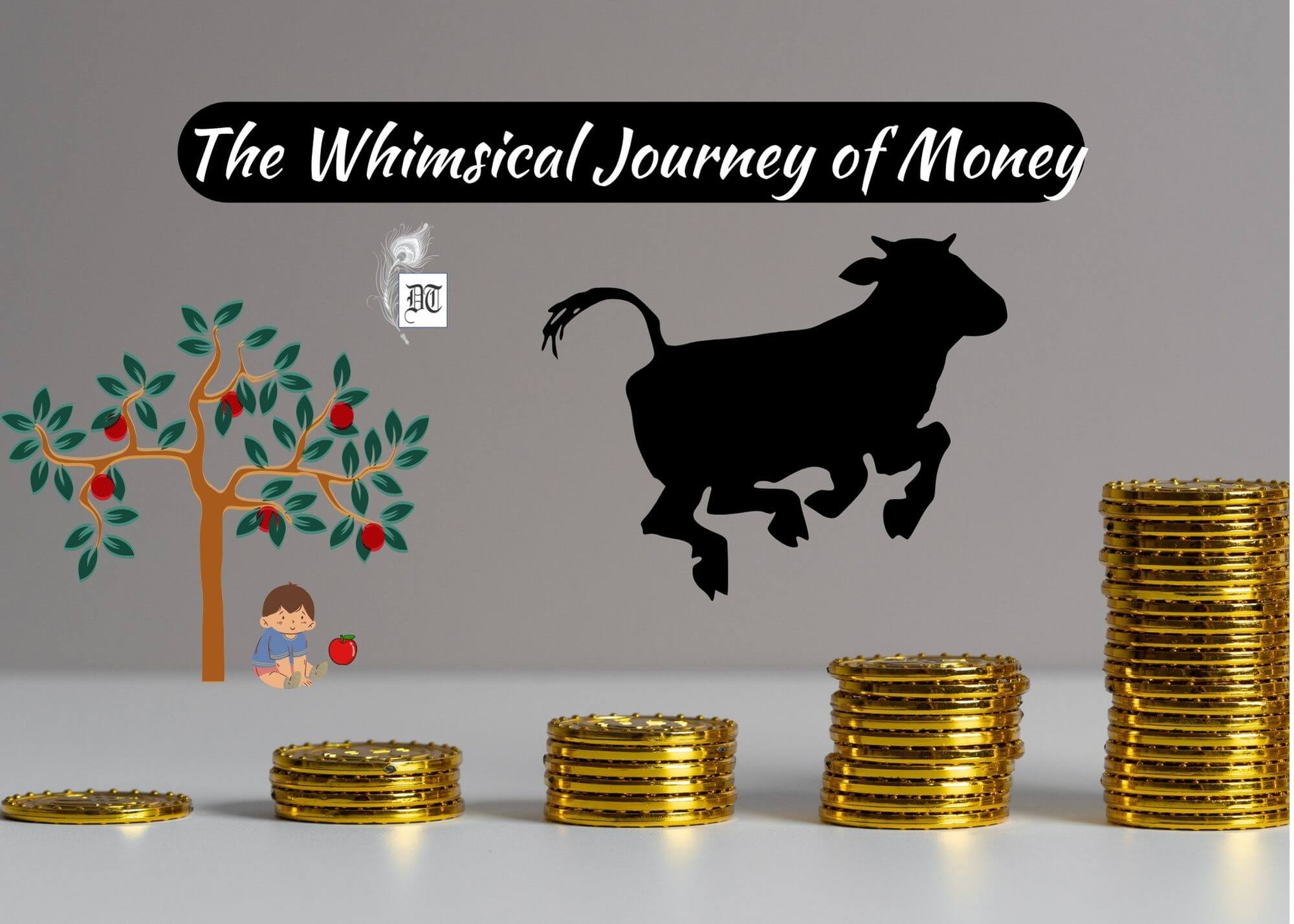From Gilded Age empires to pixelated portfolios, Mitali navigates the curious crossroads of finance, history, and imagination, where the lines between fact and fantasy blur—a spoof exclusively for Different Truths.
Are we all growing wealthier by the day? We have more money than we did a hundred years ago, or even two hundred years ago. Our financial wizards, when they sell stocks and shares, and also our banks, would all make us believe that investments only increase our wealth…
Defying all laws of gravity, money and stocks keep climbing higher and higher and higher…
Defying all laws of gravity, money and stocks keep climbing higher and higher and higher…till I guess they leave the stratosphere and float in outer space… Can you imagine currency notes vying with stars and shining in our night sky or bulls and bears frisking up ladders that reach beyond the clouds? The cows must have ambled with the bulls up the ladder. That is probably how a cow jumped over the moon, defying—again—all laws of gravity.
And that is the reason why they wrote the rhyme: ‘Hey Diddle Diddle’. This was the rhyme that declared the cow jumped over the moon. It was first published in 1765, only about four decades after the death of Isaac Newton, who discovered gravity, and more than a century after the establishment of the first stock exchange by the Dutch East India Company and then subsequently, closer to the poem’s publication date, the British one.
Returning to the concept of stocks defying gravity, we first need to understand the terms our finances set out to override. After all, the story given out is that Newton watched an apple fall straight from the tree to the ground (instead of zigzagging across the garden) and chanced upon the force we call gravity. He called it gravity because the mass of the objects involved affected the force and the Latin word for mass or weight was gravitas — Hey! That is truly factual and dry…
Being plagued with a vivid fertile imagination, I had always pictured it a bit differently.
Being plagued with a vivid fertile imagination, I had always pictured it a bit differently. On a bright sunny day in England — the weather itself is a bit of an oxymoron, I guess — this young boy relaxed under an apple tree, watching white cirrus clouds float by… Imagine it all, though the garb would be rather restrictive seventeenth century and gravity had existed long before Newton thought of naming it. Suddenly, a luscious, bright, red fruit fell on the young boy’s head. As he rubbed the painful spot on his noggin, inside the small bump on his head that had sprouted where the apple bounced before falling to the ground, an idea lit up like a bulb. And putting two and two together, he thought of gravity. It is important to note in my narrative — that it was the bump that did it, that was the turning point, the eureka moment… the flash point in terms of modern Marvels.
The prosaic say the apple in question was of a rare variety called the ‘Flower of Kent’ and can be savoured to this date. Newton, however, must have been imaginative, I guess, or how could he have come up with this concept which affects the universe literally — gravity.
Gentlemen pursued science and arts as a leisurely hobby in those times. However, I still like to think of Newton as a young backbencher who broke all rules and defied all imagined concepts and came up with gravity because he had no Twitter, Insta or Reddit and spent his idle time gazing at clouds and thinking of sweet nothings. Life those days did not know of social media just as life in current times without these handles and apps would draw to a halt! People were lesser in number — the world population in 1700CE was only 610, 000,000. So, it was easier to spare bears and bulls. Cows of course ambled in – they were everywhere as they are still in some places on Earth, on roads, off roads, on pavements and in sheds, revered and ritualised. Bulls and bears could have been sent to climb up the ladders of stocks and shares with cows just ambling in for the fun of it. While the bulls and bears juggled stocks, the cows would be directed to jump over the moon, which technically would have made them all space debris by current findings. But in those days, there were witches and magic, and things were different.
They did not ask mankind to invest but went back to nature’s forces to find solutions.
Sometimes, these boundaries get fuzzy in any case. Now, you have Wicca listed as a modern pagan movement whereas, in those days, witches were burnt at the stake. They did not ask mankind to invest but went back to nature’s forces to find solutions. They also did not encourage wars, trade or annexations which made money grow. They did strange things that rulers, who saw themselves as guardians of land, property, and money, could not understand. I am not writing for witches, but we all know things powerbrokers did not understand were erased and dubbed evil — a thought process that continues to make us kill more of our kind in wars. Wars in the past lead to looting. The latest trends in such operations show there is nothing left to loot!
One of our modern-day historians, William Dalrymple, tells us in his book, Anarchy, that ‘loot’ became a common parlance in the English dictionary only after the advent of trade between the British East India Company and Mughals. In the wonderful podcast called The Empire, Dalrymple and Anita Anand, go on to elucidate further on how stocks were sold in London to raise money by the East India Company. The word favoured for such entrepreneurs could at conservative best be adventurers. The podcast went as far as to imply buccaneers and pirates. These traders were also permitted by royalty to go on these fantastic adventures to grow wealth and power, historically dubbed as three Gs — Gold, Glory and God — in that exact order (though what is given out is — Gold, God, Glory — for we all know human nature…).
Since the financiers were still not that well versed in trade— they were pioneers — as early as 1769, the Bengal bubble burst and the East India Company stocks crashed. So, what happens when stocks crash?
Investors like us found their money floating beyond the reaches of humanity with bears, cows, and bulls in outer space.
Investors like us found their money floating beyond the reaches of humanity with bears, cows, and bulls in outer space. This happened again and again in the course of history. And there are stories (some call them myths) about how some who suffered losses shot themselves or others and few jumped off balconies… but all that is historic… in the past.
Now stocks only rise higher and higher as even the currency is Fiat Money — pitched against the government’s will and word almost all over the world and not on gold as of yore. The late President Nixon made this fantastic reform in the last century. The idea was to enable notes to fly higher to the stars for eternal redemption for we know the majority of governments’ promises are not made to win elections but to ensure the lightness of being! Godmen and religious leaders in politics ensure that.
So, we can invest, invest, and invest — and may our currencies find footage among the stars in outer space! Maybe, some aliens will find these notes in the distant reaches of the universe to become curious enough to study the artefacts left on Earth by our species. Or perhaps, the currencies will find a home on a meteor flashing fiery flames as it hurtles to its untimely end. Or maybe, they will just enrich further Adam — not our forefather but the father of modern economics — Adam Smith, who might be lurking among stars that glance down at our little green planet, now changing shades due to climate change. But colours and climates change in any case. We did have the ice age when they had no currency and no investments. Therefore, that is not an epoch I want to write of here. I want to dedicate this narrative to only money and investments which with their long reach might well outlive our species in the universe.
Picture design by Anumita Roy





 By
By
 By
By

 By
By